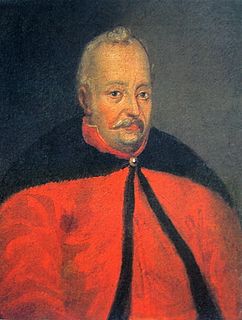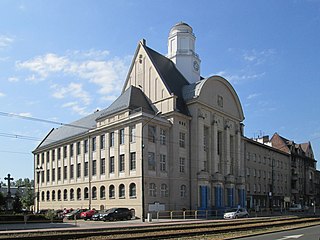
Silesian Voivodeship, or Silesia Province is a voivodeship, or province, in southern Poland, centered on the historic region known as Upper Silesia, with Katowice serving as its capital.

Katowice is an industrial city situated in the Silesian Region of southern Poland, and the central city of the Upper Silesian metropolitan area. It is the 11th-most populous city in Poland, while its urban area is the most populous in the country and 21st-most populous in the EU.

Jaworzno is a city in southern Poland, near Katowice. It lies in the Silesian Highlands, on the Przemsza river. Jaworzno belongs to the historic province of Lesser Poland. The city is situated in the Silesian Voivodeship since its formation in 1999, previously (1975–1999) it was in Katowice Voivodeship. Jaworzno is one of the cities of the 2,7 million conurbation – Katowice urban area and within a greater Silesian metropolitan area populated by about 5,294,000 people. The population of the city is 91,563 (2018).

Warsaw is one of the most important education centres of Poland. It is home to four major universities and over 62 smaller schools of higher education. The overall number of students of all grades of education in Warsaw is almost 500,000. The number of university students is over 255,000.

The Zamoyski Academy 1594–1784) was an academy founded in 1594 by Polish Crown Chancellor Jan Zamoyski. It was the third institution of higher education to be founded in the Polish–Lithuanian Commonwealth. After his death it slowly lost its importance, and in 1784 it was downgraded to a lyceum. The present-day I Liceum Ogólnokształcące im. Hetmana Jana Zamoyskiego w Zamościu is one of several secondary schools in Zamość.

The University of Silesia in Katowice is an autonomous state-run university in Silesia Province, Katowice, Poland. It should not be confused with a similarly named university in the Czech Republic, the Silesian University in Opava.

University of Economics in Katowice is a higher education institution in Katowice, Poland.

The Metropolitan Association of Upper Silesia and Dąbrowa Basin, usually referred to in Poland as the Silesian Metropolis or Metropolis GZM, is an association of composed of 41 municipalities in the Silesian Voivodeship of Poland. The seat of the metropolitan council is Katowice, the largest city of the region and its capital. The Silesian Metropolis lies within one of the largest urban areas in the European Union.

The Poznań University of Economics and Business is a business school in Poland.

The Jan Matejko Academy of Fine Arts in Kraków, is a public institution of higher education located in the centre of Kraków, Poland. It is the oldest Polish fine art academy, established in 1818 and granted full autonomy in 1873.

Poland is one of the most religious countries in Europe. Though varied religious communities exist in Poland, most Poles adhere to Christianity. Within this, the largest grouping is the Roman Catholic Church: 92.9% of the population identified themselves with that denomination in 2015 ; according to the Institute for Catholic Church Statistics, 36.7% of Polish Catholic believers attended Sunday Mass in 2015. Poland is one of the most Catholic countries in the world; Neal Pease describes Poland as "Rome’s Most Faithful Daughter."

The Borders of Poland are 3,511 km (2,182 mi) or 3,582 km (2,226 mi) long. The neighboring countries are Germany to the west, the Czech Republic and Slovakia to the south, Ukraine and Belarus to the east, and Lithuania and the Russian province of Kaliningrad Oblast to the northeast. To the north, Poland is bordered by the Baltic Sea.

The University of Warsaw, established in 1816, is the largest university in Poland. It employs over 6,000 staff including over 3,100 academic educators. It provides graduate courses for 53,000 students. The university offers some 37 different fields of study, 18 faculties and over 100 specializations in Humanities, technical as well as Natural Sciences.

The Teacher Training College of Bielsko-Biala was an educational institution in Poland. It was established in 1991 continuing more than century-old traditions of teacher training in the city and region. It was the largest teacher training college in the country. The College was closed down on September 30, 2015.
Jagiellonian University Medical College is the oldest medical school in Poland. The Jagiellonian University's Faculties of Medicine and Pharmacy are acclaimed as one of the largest medical academies in Poland. The school was established by King Casimir III of Poland in 1364.

The Pentecostal Church in Poland is a Pentecostal Christian denomination in Poland. It is the largest Pentecostal denomination in Poland and a part of the World Assemblies of God Fellowship. The Pentecostal Church in Poland is a member of Pentecostal European Fellowship and Biblical Society in Poland. Headquartered in the city of Warsaw.

The Karol Szymanowski Academy of Music is a school of music of university level in Katowice, in Poland. It is named for Karol Szymanowski.

Paweł Jędrzejko is a literary scholar and an Americanist, translation studies scholar, musician and yachtsman. Member of the Polish a cappella sextet Banana Boat.



















